
La dispensa tratta dei rudimenti della logica combinatoria partendo dal significato di livello logico per trattare le porte logiche fondamentali, quelle universali, le funzioni logiche, etc
- Material Type:
- Textbook
- Date Added:
- 03/20/2013

La dispensa tratta dei rudimenti della logica combinatoria partendo dal significato di livello logico per trattare le porte logiche fondamentali, quelle universali, le funzioni logiche, etc

In this activity, students will get to know each other by asking different questions in relation to their hobbies and their lives. This way they will learn each other's preferences.

Students will discuss the environment and their favorite ways to get around and things to do outside. Students will also be able to compare and contrast between transportation options in both their hometown and Spanish speaking countries.

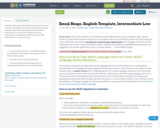
Students will practice discussing their preferences, how to defend and support their ideas. Students learn topics through a game of bingo and express how relevant certain ideas are over others. Students will use technology to communicate with peers about their preferences on a variety of topics.
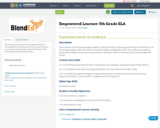
This Empower Learner Activity engages students in self-assessment, preliminary goal setting and reflection on use of learning strategies within the context of 5th Grade English studying Winin Dixie.
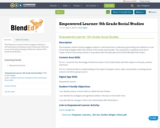
This Empower Learner Activity engages students in self-assessment, preliminary goal setting and reflection on use of learning strategies within the context of 5th Grade Social Studies.
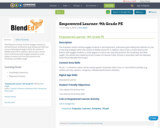
This Empower Learner Activity engages students in self-assessment, preliminary goal setting and reflection on use of learning strategies within the context of Middle School PE. In addition, there is also a choice board at the bottom that engages students in some degree of control over how they practices the Vocabulary and Skills taught.
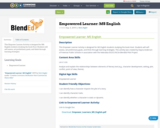
This Empower Learner Activity is designed for MS English students studying the book Hoot. Students will self-assess, set preliminary goals, and think through learning strategies.
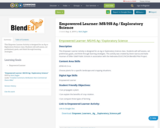
This Empower Learner Activity is designed for an Ag or Exploratory Science class. Students will self-assess, set preliminary goals, and think through learning strategies.
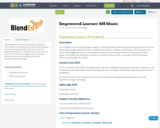
This Empower Learner Activity engages students in self-assessment, preliminary goal setting and reflection on use of learning strategies within the context of Middle School Music. In addition, there is also a choice board at the bottom that engages students in some degree of control over how they practices the Vocabulary and Skills taught.

Arkansas Open Resource project English Arts Unit Overview template.
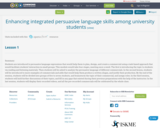
Students are introduced to persuasive language expressions that would help them to plan, design, and create a commercial using a task-based approach that would facilitate students' interaction in small groups. This module would take four stages, meeting once a week. The first is introducing the topic to students via reading and listening materials. Then students will be asked to analyze the persuasive language of different commercials. In the second lesson, students will be introduced to more examples of commercials and adds that would help them produce a written slogan, and justify their production. By the end of the session, students will be divided into groups of five to seven students, and brainstorm the topic of their commercial, and assign roles. In the third session, students will hold further discussions of their topics, and fill in any gaps that existed during their previous preparations with the help of the instructor. In the last session, students will display their recorded videos, and all the pre-recorded commercials will be celebrated by the whole class.
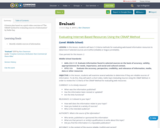
A lesson plan based on a quick video overview of "The CRAAP method for evaluating sources of information" by Kallie Gay.

Understand the history of management by studying management theories from the Industrial Revolution to today.
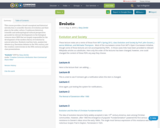
This course provides a broad conceptual and historical introduction to scientific theories of evolution and their place in the wider culture. It embraces historical, scientific and anthropological/cultural perspectives grounded in relevant developments in the biological sciences since 1800 that are largely responsible for the development of the modern theory of evolution by natural selection. Students read key texts, analyze key debates (e.g. Darwinian debates in the 19th century, and the creation controversies in the 20th century) and give class presentations.
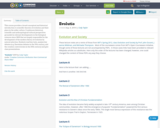
This course provides a broad conceptual and historical introduction to scientific theories of evolution and their place in the wider culture. It embraces historical, scientific and anthropological/cultural perspectives grounded in relevant developments in the biological sciences since 1800 that are largely responsible for the development of the modern theory of evolution by natural selection. Students read key texts, analyze key debates (e.g. Darwinian debates in the 19th century, and the creation controversies in the 20th century) and give class presentations.
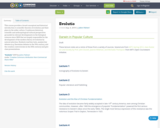
This course provides a broad conceptual and historical introduction to scientific theories of evolution and their place in the wider culture. It embraces historical, scientific and anthropological/cultural perspectives grounded in relevant developments in the biological sciences since 1800 that are largely responsible for the development of the modern theory of evolution by natural selection. Students read key texts, analyze key debates (e.g. Darwinian debates in the 19th century, and the creation controversies in the 20th century) and give class presentations.
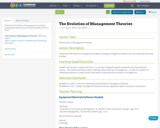
Understand the history of management by studying management theories from the Industrial Revolution to today.